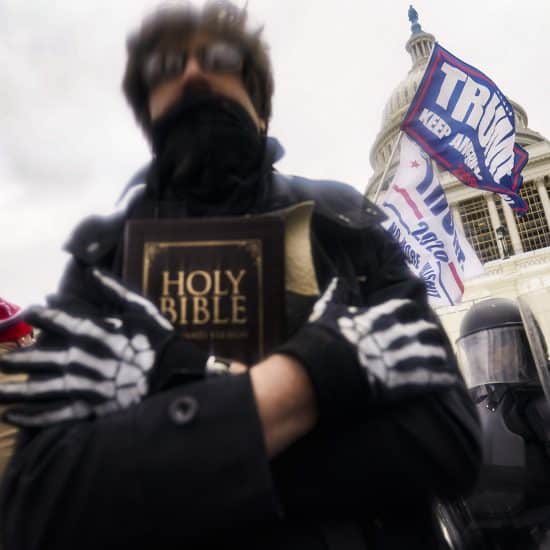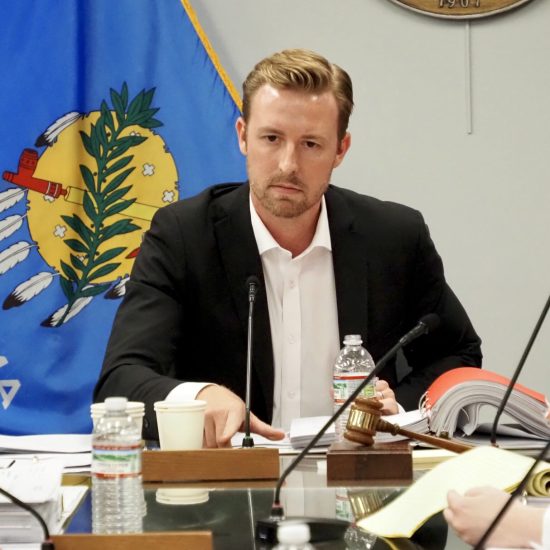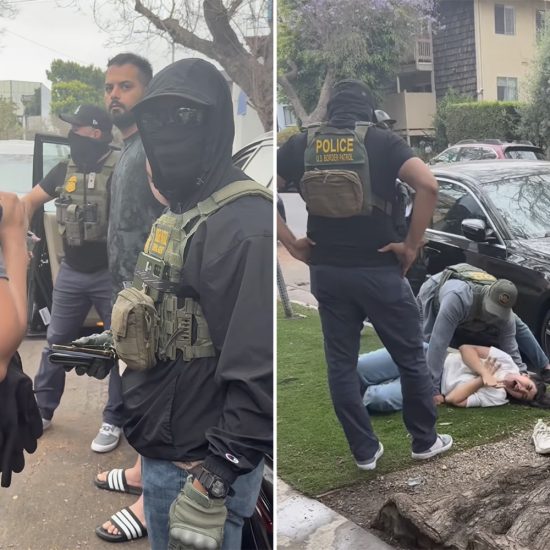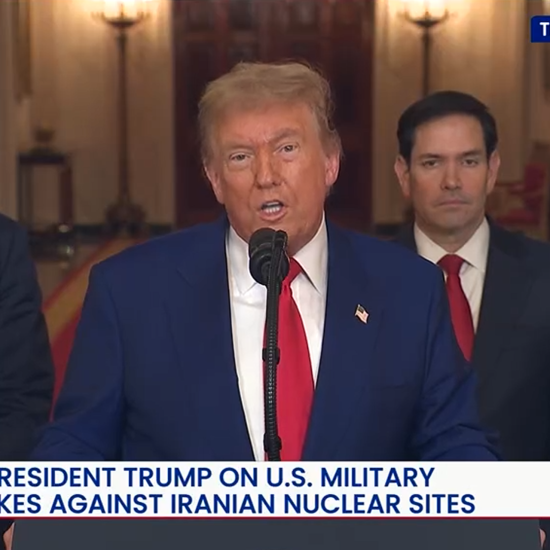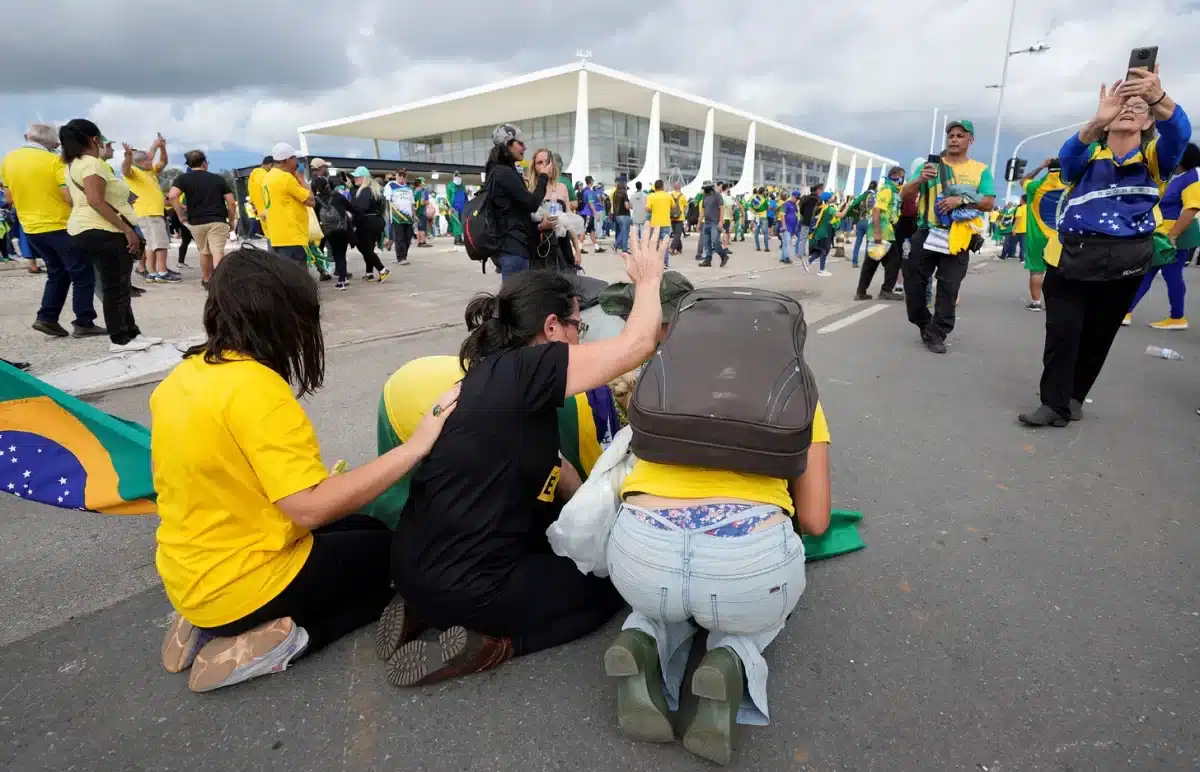
A violent mob, full of people who refuse to believe their presidential candidate lost, stormed their nation’s capital on a January day of fury. But this time it wasn’t in Washington, D.C.
On Sunday (Jan. 8), thousands of supporters of now-former Brazilian President Jair Bolsonaro ransacked multiple government buildings, including the Congress, Supreme Court, and presidential palace. The attack, which occurred just a week after the inauguration of President Luiz Inácio Lula da Silva, came after months of protests and claims of election fraud by Bolsonaro’s supporters after the close presidential vote in October.
With pre-election polls showing former President da Silva would likely return to office, Bolsonaro started making claims of election fraud before votes were even cast. And long before da Silva won by more than 2 million votes, Bolsonaro suggested that if he lost, Brazil would “have worse problems” than the U.S. did on Jan. 6, 2021. After the election, Bolsonaro’s party sought unsuccessfully to convince judges to invalidate votes.
Long nicknamed the “Trump of the tropics,” Bolsonaro even found allies among prominent supporters of former U.S. President Donald Trump. Individuals like Steve Bannon and Ali Alexander, who pushed false U.S. election fraud claims ahead of Jan. 6, more recently attacked the legitimacy of the Brazilian election results and now praise those who attacked government buildings in Brasília.
But the parallels between Jan. 6 in the U.S. and Jan. 8 in Brazil don’t end there. The violence on Sunday also echoed the U.S. insurrection with the prominent role of Christian rhetoric and symbols. Similar to the energy around Trump’s ascension in 2016 and his efforts to overturn the 2020 election, Bolsonaro built a base of evangelical and Pentecostal supporters to fuel his election win in 2018 and the protests against his 2022 loss.
Although more details about Sunday’s violence will come out in the days and weeks to come, already we can see the religious influences in the images and videos of the crowd. During the melee, members of the pro-Bolsonaro mob stopped to kneel in prayer or gathered to hold hands in a circle. Others carried Christian symbols, including a man apparently holding a rosary in the direction of riot police as if keeping them away.
While many in the crowd wore yellow Brazilian soccer jerseys — which has become the uniform of choice for rightwing supporters of Bolsonaro — some people wore yellow shirts with religious-themed Bolsonaro slogans like “Deus Acima de Todos” (“God above all”) or hung up large yellow banners with phrases like “Deus – Pátria – Família – Liberdade” (“God – Country – Family – Liberty”). Similar to the Trump flags on Jan. 6, some on Jan. 8 carried Brazilian flags featuring Bolsonaro’s face and his “God above all” slogan.
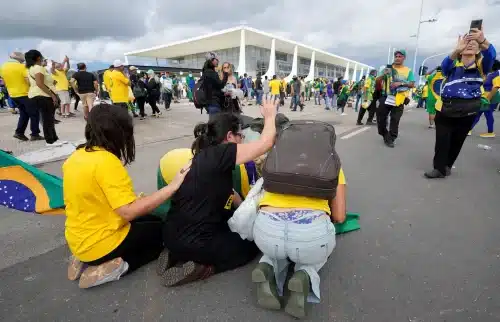
Supporters of former President Jair Bolsonaro kneel to pray as they storm the presidential palace in Brasilia, Brazil, on Jan. 8, 2023. (Eraldo Peres/Associated Press)
Other religious imagery in the crowd included someone waving an Israeli flag as another member of the mob proudly held up a confiscated artifact from a nearby government building. The flag of Israel had already been appropriated by Bolsonaro supporters prior to Jan. 8. Bolsonaro’s wife showed up to vote for her husband in October while wearing a shirt with Israel’s banner. But Michelle Bolsonaro isn’t Jewish. She’s Baptist (and even opened up the now-ransacked presidential palace for her church to hold worship services). When her husband attempted to shut down the Supreme Court in 2020, he did so while speaking next to a waving Israeli flag, which sparked condemnation from Brazilian Jews.
There were also religious leaders involved in Sunday’s demonstration that turned violent. Gospel singer Salomão Vieira de Jesus apparently served as one of the organizers of the protest. Another gospel singer, Fernanda Ôliver, livestreamed during the riot. An evangelical pastor recorded a video of himself during the day’s events, claiming “the Brazilian people are waking up.” Another pastor who was there said he stayed across the street and claimed the violence was actually started by leftists who infiltrated the rally (mirroring similar “false flag” conspiracies made by rightwing pundits after Jan. 6 in the U.S.).
Additionally, religious expressions permeated the pro-Bolsonaro protests against the election results in the months leading up to Sunday’s riot. Like with times of prayer, the blowing of shofars, and marches with Bibles, crucifixes, icons, and religious signs. Many of those who have been working to overturn the election results saw themselves as fighting for God as they backed the man whose middle name is Portuguese for Messiah.
Like on Jan. 6, the religious messages and symbols in the crowd on Jan. 8 sadly aren’t surprising. Not only did Bolsonaro court evangelical and Pentecostal communities during his campaigns and presidency, but the pro-Bolsonaro election-denying protests in Brazil the past few months included Christian rhetoric mixed in with political claims.
While many reporters and commentators draw comparisons between Jan. 6 and Jan. 8, religion is too often being left out of the conversation. So this issue of A Public Witness looks at the role of Christianity in Brazilian politics and considers what the violence on Jan. 8 means for churches.
Putting God on the Ballot
There are millennials who are older than democracy in Brazil. The country only transitioned from military to civilian rule in the late 1980s. That democratic journey has been marked by violence, backsliding, and other turbulent episodes. Conservative Catholics and evangelicals can often be found at the center of the nation’s power struggles.
Consider the controversial 2016 impeachment and removal from office of then-president Dilma Rousseff, an episode that served as a prelude to the rise of Bolsonaro. While allegations of corruption sparked the case, many saw the process as driven by politics. Brazilian Anglicans joined other progressive Christian traditions in supporting Rousseff, while evangelicals and Pentecostals were pivotal players in the movement to oust her.
As the nation’s religious makeup changes, that also impacts politics. The rise of conservative Protestants in politics reflects the country’s changing religious demographics, as a once-dominant Catholic Church has ceded significant numerical ground.
“Such a radical transformation in Brazil’s religious landscape has given rise to discussions about the emergence of a ‘Brazilian Christian right’ — a movement similar to the American Christian right in its ability to reshape politics,” Omar G. Encarnación wrote for The Nation. “Like the rise of Jerry Falwell’s Moral Majority in the early 1980s, which ushered in the emergence of the American Christian right, Brazilian evangelical leaders have entered the political fray motivated by a sense of moral outrage.”
This nascent coalition channeled its energies into Bolsonaro’s bids for the presidency in 2018 and 2022. Throughout the campaigns, he explicitly emphasized traditional understandings of gender roles, family structures, and the country’s “Judeo-Christian” heritage. Not only did Bolsonaro seek out support from conservative Christian constituencies, but he legitimized their activism and acknowledged their influence by rewarding them with the spoils of the office.
“Bolsonaro supported evangelical pastors and conservative Catholic priests campaigning to keep the churches open during the pandemic, showing strong opposition to lockdown, masking, and social distancing measures,” Baptist religious scholars Raimundo Barreto and João Chaves (both U.S. academics from Brazil) explained in The Christian Century in 2021. “[While in office], he named his former attorney general André Mendonça, a Presbyterian minister, to fill a vacant seat on the Brazilian Supreme Court. Bolsonaro has contributed significantly to the growth of evangelical political power. The far-right alliance forming the base for Brazil’s Catholic president has consolidated him as the central figure of Brazilian Christian Nationalism.”
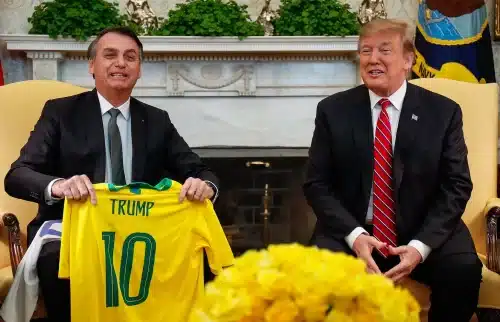
Jair Bolsonaro gives Donald Trump a personalized Brazilian soccer jersey during a White House visit on March 19, 2019. (Alan Santos/Creative Commons)
Recognizing the importance of the evangelical and Pentecostal constituencies, both Bolsonaro and da Silva sought their support in the most recent presidential contest. While Bolsonaro focused on courting elite Christian influencers, his wife campaigned in large congregations where she equated her husband winning in 2022 with “the awakening of the church.”
Not willing to surrender the key voting bloc, da Silva peppered his campaign with biblical references. Late in the campaign, he released a letter aimed at evangelical and Pentecostal voters by defending his commitment to religious liberty, debunking misinformation about his alleged plans to persecute Christians, and extending olive branches on a number of key policy issues. Left-wing, anti-Bolsonaro evangelicals mimicked the church organizing playbook of their conservative co-religionists to bolster da Silva’s candidacy.
At times, the campaigns literally flirted with the demonic. Each candidate accused the other of being possessed by the devil, along with other sins, in their appeals to Brazil’s Christian voters.
While da Silva eked out a victory in the October runoff election, the real winners of the contest may prove to be the pastors, church leaders, and other influencers who hold sway over evangelical and Pentecostal voters. The attention each candidate directed to religious outreach demonstrates both the perceived size and value of these groups to winning elections.
Yet, political scientist Amy Erica Smith cautioned in Religion Unplugged against seeing this constituency as overly similar to politically-engaged Christian conservatives in the United States. Brazil’s religious politics may prove as messy and fluid as its partisan politics. Smith cited three reasons for caution.
The first is what the term “evangelical” conveys. In Brazil, the term encompasses more theological diversity than it does in the United States. Second, is the contrast in political institutions. Instead of being dominated by two major political parties, electoral rules in Brazil incentivize a broader array of parties, with candidates often switching affiliations and different parties coming and going from the political scene. The durable connection between Christian conservatives and the Republican Party is unlikely to find a mirror image in Brazil despite the momentary affinity between evangelicals and Bolsonaro. Finally, the policy agenda of Christian voters in Brazil is broader than their U.S. counterparts. While both groups prioritize social issues, Brazilians hold more progressive stances when it comes to the government’s role in protecting the environment and reducing poverty.
While such nuances are important to grasp, both the presidential campaign and recent protests make clear that Christian Nationalism animates political passions among a segment of religious voters in both countries. There’s little subtlety in the appeals by candidates to equate being fully American or being authentically Brazilian with being Christian (in the narrow way it is defined for their own partisan gain). While taking different expressions in various countries, Christian Nationalism poses a global threat.
Get cutting-edge reporting and analysis like this in your inbox every week by subscribing today!
Global Evangelism
As the violence in Brazil unfolded on Sunday, many reporters and commentators rightly drew comparisons between what was happening then and what previously occurred in Washington, D.C., two years earlier. Although it would be too much to say Jan. 8 happened solely because of Jan. 6, they cannot be viewed as unrelated. As Brian Klaas, a professor of global politics at University College London, explained yesterday in his Substack newsletter The Garden of Forking Paths, “It would be a mistake to think that the striking similarities between Jan. 6th in Washington and Jan. 8th in Brazil were produced by chance.”
“Instead, it’s a classic case of what political scientists refer to as ‘authoritarian learning,’ the diffusion of autocratic tactics across borders,” Klaas added. “We’re stuck with a startling fact: the world’s most powerful democracy has become an exporter of autocratic innovation.”
As Klaas pointed out, it’s not merely that people might be inspired by efforts in other nations. In this case, there are even direct ties. In fact, one of Bolsonaro’s sons, a Brazilian congressman, was even in Washington, D.C., on Jan. 6, 2021, after meeting with Ivanka Trump and others at the White House the day before. That son, Eduardo, spoke last year at a conservative political event in Florida sponsored by Turning Point USA, a group led by Charlie Kirk and which bussed people to D.C. for Jan. 6. Eduardo returned to Florida after his father lost reelection to meet with Trump at Mar-a-Lago. And now Jair M. Bolsonaro is also in Florida, as if the state is the new retirement destination for ousted would-be authoritarian leaders.
Shared tactics, advisors, and ideologies mean we might see more such violence.
“These are dangerous times,” legal theorist Camila Vergara recently warned in Politico. “Far-right leaders are selling popular empowerment based on the discrimination and oppression of ‘the other’: immigrants, gender dissidents, feminists, religious minorities, left-wing ‘radicals,’ the indigenous, and the poor.”
Vergara also argued that the success of these appeals is found in the use of Christian Nationalism to excite religious passions and the use of social media “to amplify propaganda and ‘fake news’ that further normalizes extreme ideas.”
Whatever challenges such populism creates for the governments of specific nations, the universal Church must wrestle with Christianity increasingly being identified with misinformation, authoritarian ideas, and extreme and violent rhetoric on the global stage. In this sense, recent elections in Brazil, the United States, and other places are case studies that each highlight a much larger problem. Christian Nationalism is redefining what it means to follow Jesus in ways that deny the gospel and reduce faith to the service of partisan ends.
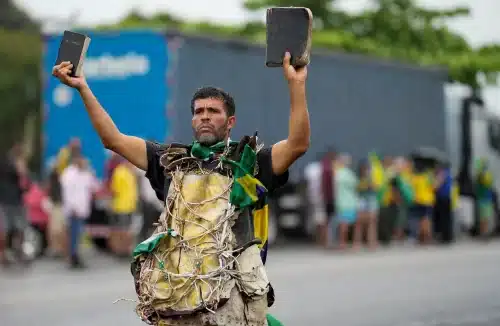
A supporter of then-President Jair Bolsonaro holds up Bibles as truckers block a highway in Itaborai, Brazil, on Nov. 1, 2022, to protest Bolsonaro’s election loss. (Silvia Izquierdo/Associated Press)
Much like Trump and Bolsonaro received advice from shared political figures (like Steve Bannon), they’ve also been helped by their shared religious supporters. Like Lou Engle. The Pentecostal preacher peddled claims of “voter fraud” after the 2020 presidential election, casting the results showing Trump lost as proof of demonic forces at work. But Engle doesn’t just evangelize in the United States. He’s held large “The Send” prayer rallies across the country, but also in Brazil.
With more than 140,000 people attending the 12-hour “The Send” event in Brazil in 2020, then-President Bolsonaro came on stage to talk about his faith in Jesus. That led journalist Jon Ward to wonder about the impact of such religious movements on this week’s political scene in Brazil.
“Is there any self-reflection going on among Christian leaders who have supported Trump and Bolsonaro?” Ward wrote in his Substack newsletter Border-Stalkers yesterday. “Twice now, political leaders who were elected in no small part because of evangelicals have refused to acknowledge their losses, and their supporters have waged violent assaults on their country’s own government, law enforcement, and journalists. Is there any self-assessment inside evangelicalism among the many Christian leaders whose support enabled both these men to get elected and to nearly topple their respective democracies?”
The Catholic Church in Brazil quickly condemned Sunday’s violence. A statement from the National Conference of Bishops of Brazil argued, “These attacks must be immediately stopped, and their organizers and participants must be held accountable to the fullest extent of the law. Citizens and democracy need to be protected.”
It’s a good first step. Christian leaders must condemn the violence. But then Christians must also consider how pastors and churches helped inspire the attack on the government. And Christians in the U.S. need to evaluate our role in the violence of Jan. 6 and Jan. 8. We must stop going therefore to make disciples of all nations as we baptize them into the gospel of insurrection.
As a public witness,
Brian Kaylor & Beau Underwood


